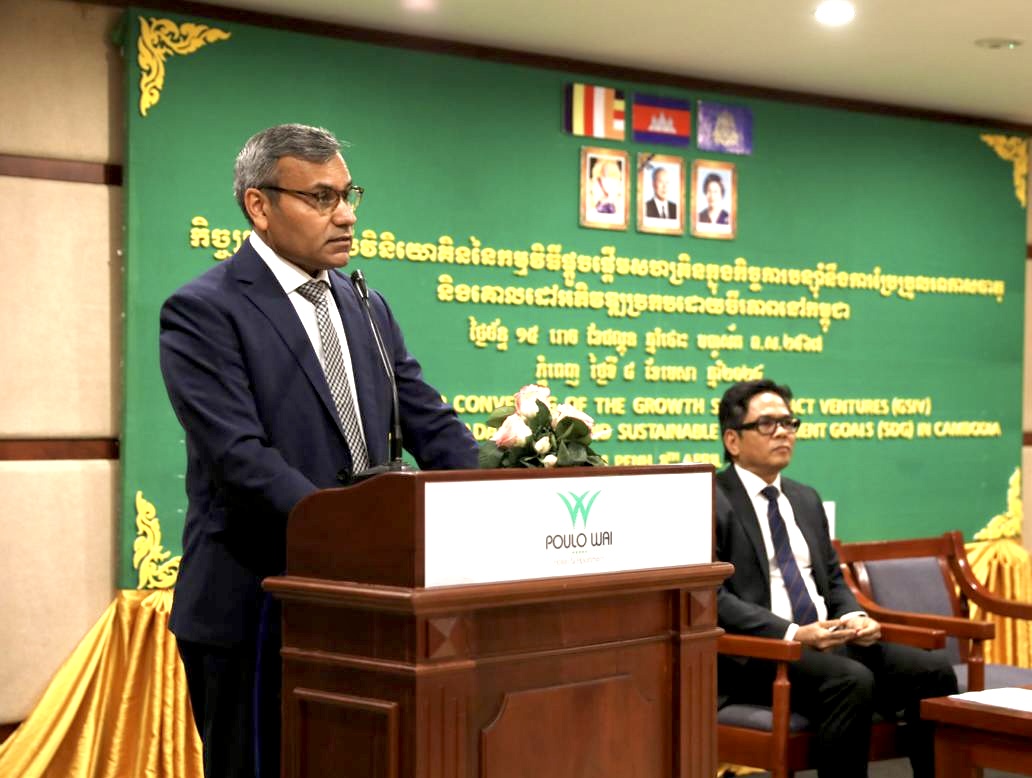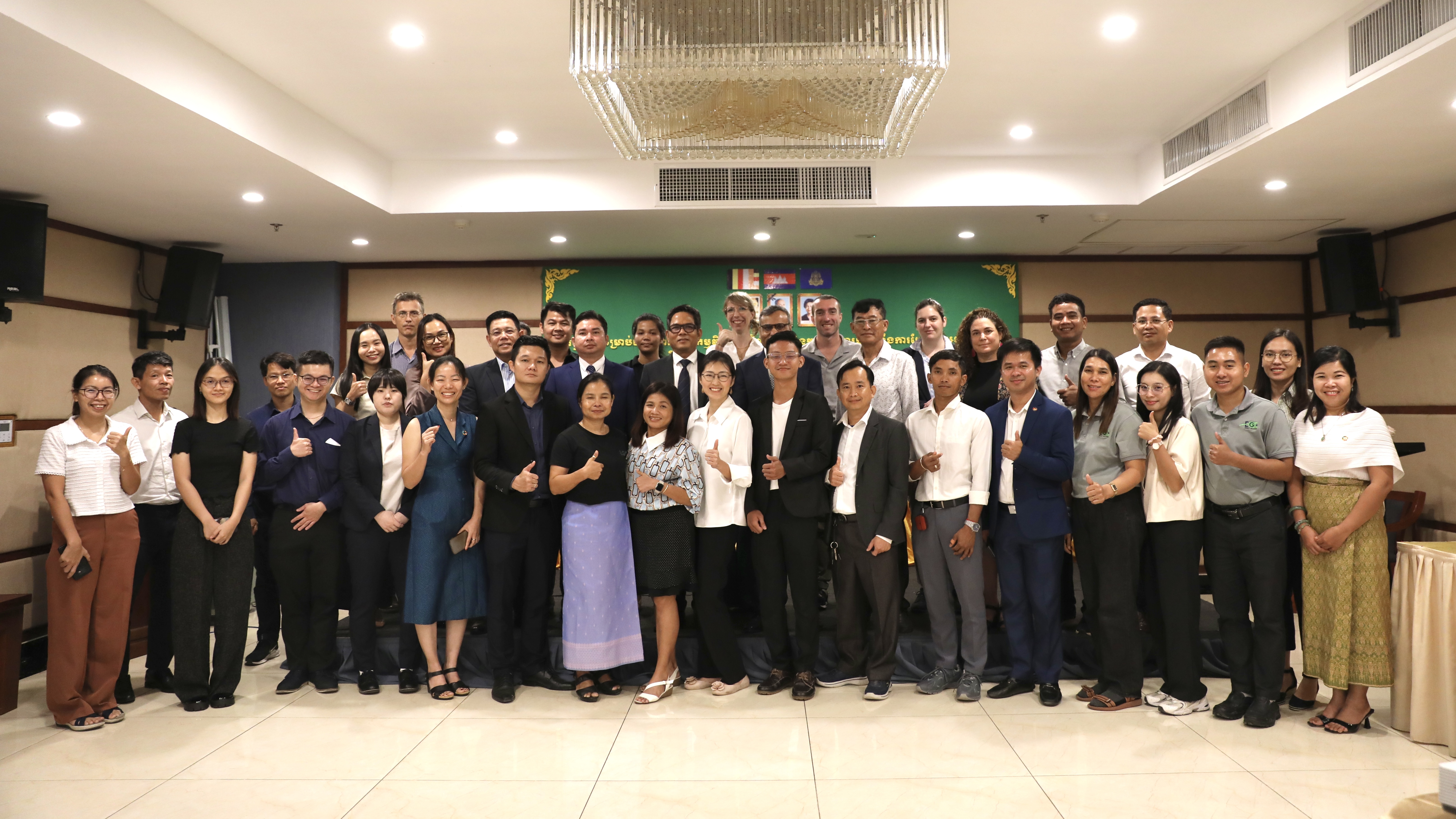Opening Remarks by Mr. Shakeel Ahmed, Deputy Resident Representative, UNDP Cambodia
UNDP Cambodia Investor Convening
April 8, 2024

Good morning,
H. E. OUM Kosal, Under Secretary of State Cambodia Ministry of Commerce
Representatives from Ministries, Enterprises and Investors
I would like to welcome you to this Investor Convening session. I am very pleased to share that we have completed the selection process of the Growth Stage Impact Ventures (GSIV) programme which was designed to identify and foster Cambodian start-ups and business ventures that are ready to help the country address the dual challenges of economic growth and climate resilience. You will hear the GSIV finalists present their solutions for promoting sustainable growth in Cambodia.
According to the 2024 Regional Human Development Report published by UNDP, Asia-Pacific is most dynamic and the fastest growing regions. It has gained 19 percentage points in the Human Development Index (HDI) and Cambodia has been on the forefront in significantly reducing multidimensional poverty. This growth, however, comes with its own set of challenges and responsibilities, especially in the face of the climate crisis—a crisis that threatens to unravel decades of developmental gains. Progress has not been distributed equally. We are facing an uncertain future, therefore Cambodia has to focus on reducing inequality, vulnerability and human insecurity. One of the paths highlighted by the report is to accelerate climate change adaptation and diversifying the local economy. This is especially important as Cambodia ranks amongst the most vulnerable countries to climate change. Based on modelling conducted in 2019 by UNDP, the Ministry of Economy and Finance, and the Ministry of Environment, it was estimated that climate change is likely to reduce absolute GDP by 2.5 percent by 2030 and by almost 10 percent by 2050. A World Bank report published in 2023 reached similar findings. Therefore, we need to commit to sustainable development, powered by the innovations of Cambodian start-ups and the support of the global investment community.
On a global level, despite modest upward trends, financing for climate change adaptation delivered to developing countries remains far below the scale necessary to effectively respond to the climate impacts facing developing countries and communities. A report on the adaptation gap report published by the International Institute for Sustainable Development (IISD) in 2023 states that the needs of developing countries for adaptation are between $215 billion and $387 billion yearly, 18 times higher than international public finance flows. This is exacerbated by heavily bureaucratic approaches for accessing financial resources, while investment-ready adaptation projects are often said to be hard to identify. To bridge this challenge, the UN Secretary General launched the “Adaptation Pipeline Accelerator” initiative in 2022. This support is very much needed as 27 countries in Asia-Pacific countries have updated their climate adaptation plans, but only 8 percent of the regional finance for climate change is devoted to adaptation.
According to the World Bank, foreign direct investments (FDI) accounted for 13.5 percent of Cambodia’s GDP in 2019, placing it among the top 15 countries in the world with high investment rates. Cambodia obtained lower-middle-income country status in 2015 and has made important strides towards graduation from the Least Developed Country (LDC) which could materialize as soon as 2028. The graduation would change Cambodia’s access to trade preferences in key markets and to concessional finance. In this context, reducing reliance on official development assistance by fostering private sector development and improving revenue collection is essential for self-sustained growth.
Our focus today is to catalyse sustainable investment in Cambodia, leveraging the nation's forward-looking climate agenda. Given the climate adaptation financing gap, increasing investments, including by the private sector, is one of the most important prerequisites to accelerate the realization of the SDGs in a country like Cambodia.
Achieving Carbon Neutrality could increase GDP growth of 7.5% per year by 2050 and generate 321,000 green jobs. This includes significant adaptation co-benefits by enhancing economic resilience and increasing the industrial sectors competitiveness. Moreover, embracing pathways for green growth has the potential to mobilize sustainable finance, contributing to Cambodia's objectives to attract higher-quality investments and diversify trade.
The role of Small and medium-sized enterprises (SMEs) in this transformative journey is of greatest significance. According to the Ministry of Industry, Science, Technology, and Innovation (MISTI), SMEs represent up to 70 percent of employment and 99.8 percent of enterprises, while contributing to 58 percent of GDP. Yet, they face significant hurdles including - access to finance, skill gaps, and productivity challenges, to name a few. To support the growth of SMEs, the RGC has implemented various measures, which are critical for unleashing the full potential of SMEs in driving forward the national development goals.
In addition to the government’s efforts, to bridge the financial gap of climate change adaptation investments, and to help increase foreign direct investments in ready-to-invest startups, the GSIV programme was launched by UNDP in Cambodia in 2023. To identify the start-ups best placed to enhance climate adaptation in Cambodia, UNDP with the Centre for Impact Investing and Practice (CIIP) prepared the Cambodia SDG Investor Map identifying opportunity areas for the private sector to drive the SDGs. To date, most impact investments have focused on the financial services sector and microfinance institutions, with only limited investments in other sectors like agriculture, education, energy, and information and communications technology. Their sectors are though crucial for a just transition in Cambodia.
The startups you will meet today have been rigorously selected based through the GSIV programme according to their actual and potential contribution to Cambodia's sustainable development. They represent the best of Cambodian innovation, with solutions spanning energy, agriculture, and construction—all critical sectors for climate adaptation. Their work goes beyond environmental impact, offering solutions that also address social and economic challenges, bringing us closer to achieving the SDGs.
Through showcasing these start-ups, UNDP aims to demonstrate the existence of pipelines of investable ventures that can advance the transition to SDG-aligned investment in Cambodia. And as we move forward with today's proceedings, I invite you to engage with these startups, to understand their vision, and to consider the potential for impactful business partnerships and investments. Your support can make a tangible difference, not just in the trajectory of these enterprises, but in the broader context of Cambodia's sustainable development trajectory.
Lastly, I wish to express my sincere gratitude to everyone present—government officials, entrepreneurs, investors, panelists, moderators and my colleagues at UNDP here in Cambodia and in Geneva. Your dedication and commitment are the driving forces behind our collective pursuit of a sustainable future for Cambodia. Together, let's consolidate partnerships to stand the test of time, driving innovation and resilience in the face of climate change.
Thank you.


 Locations
Locations



